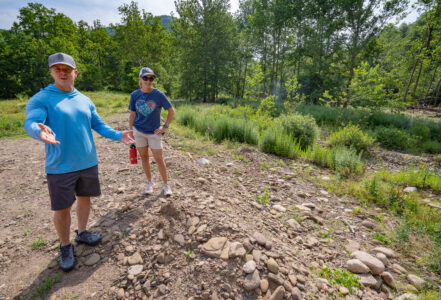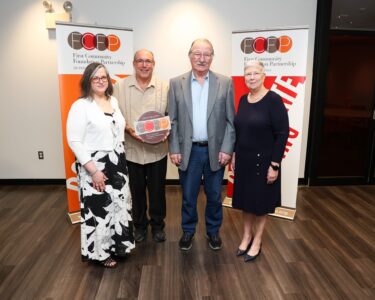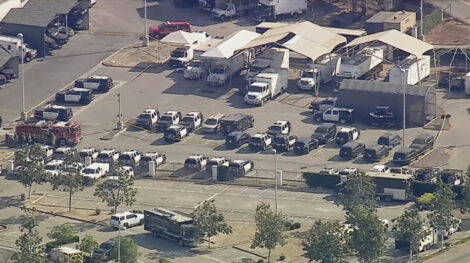Senator discusses grid reliability, experiences as legislator
State Sen. Gene Yaw, R-Loyalsock Township, spoke as part of the Law and Justice in Lycoming County speaker series at the Thomas Taber Museum. The series details how the legal system has worked in Lycoming County’s past and present.
Yaw, who represents Pennsylvania state district 23, spoke briefly about his vice chairmanship on the Judiciary committee and past legal luminaries in Lycoming County, he took the time to give a progress report, of sorts, to the community about what he has been involved with in Harrisburg.
When Yaw spoke, he was surrounded by posters that detailed Lycoming County’s legal history around the conference/meeting room. It featured photographs of former judges from the 19th, 20th and 21st centuries.
The Thomas T. Taber Museum will be a host site for a summer exhibit that will explore Law and Justice in Lycoming County – The Lawyers and Judges Who Make it Work, in association with the Lycoming Law Association. The exhibit will be featured in the Community Room of the Taber Museum from June 10 through the end of August 2025.
Yaw explained that his district is five counties.
“It’s all of Union County, Lycoming County, all of Bradford County, Tioga County and Sullivan,” Yaw said. He said much of his district was quite rural and spread out with and he represents 250,000 residents and said it was the size of the Chesapeake Bay itself.
Being a lawyer himself, he said less and less lawyers are entering politics.
“When I leave office, the chance of somebody coming in and serving an extended period of time that’s not a lawyer is pretty high,” Yaw said.
He said that in his “opinion right now, the number one issue facing Pennsylvania and the United States is grid reliability.”
“How do we keep the lights on? It is a serious issue. We have come very, very close in the past couple of years to the lights or the grid failing. Pennsylvania happens to be part of what’s called the RTO, the Regional Transmission Operator.”
According to the Federal Energy Regulatory Commission (FERC.gov), the RTO is associated with the Independent System Operator (ISO) which “…where the Commission suggested the concept of an Independent System Operator as one way for existing tight power pools to satisfy the requirement of providing non-discriminatory access to transmission. Subsequently…the Commission encouraged the voluntary formation of Regional Transmission Organizations (RTO) to administer the transmission grid on a regional basis throughout North America (including Canada)…[that]…delineated…characteristics and functions that an entity must satisfy in order to become a Regional Transmission Organization.”
“I talk about energy, it is something that’s really important,” Yaw said, who serves as chairman of the Environmental, Resources and Energy Committee.
Yaw said Pennsylvania is part of a power supplier called PJM (which stands for Pennsylvania, Jersey and Maryland) and according to FERC.gov, provides power to “Delaware, Illinois, Indiana, Kentucky, Maryland, Michigan, New Jersey, North Carolina, Ohio, Pennsylvania, Tennessee, Virginia and West Virginia.”
“It’s almost 100 years old,” the State Senator said. “They don’t own anything. All they do is control the distribution of electricity throughout 13 states. Plus the District of Columbia and they serve about 67 million people. It’s a big deal. Pennsylvania happens to be the number one exporter of electric energy in the country.”
Yaw said there are only two ways to produce electricity, “It’s thermal and non-thermal. Thermal can be gas, it can be oil, it can be coal, or it can be nuclear.”
He explained that “non-thermal is wind, solar, that type of thing.”
“What’s happening is the thermal power. It’s what’s called dispatchable. It’s available 24 hours a day, seven days a week, 365 days a year. Does it matter where the sun shines? Does it matter when it’s blowing? Does it matter whether it’s light or dark?” he said. “It’s there.”
The Senator said the problem with that is that we have consistently been using that “type of power and we have not been replacing it with something comfortable.”
He expounded that “wind and solar, they’re fine. They have their place, but they’re intermittent in a limited duration. The wind’s not (always) blowing, the sun’s not (always) shining.
He said right now “the storage is not there,” battery-wise, to “store electricity.”
“Right now the biggest need is for about 200,000 megawatts of additional power to meet the needs. Add this with the increased artificial intelligent data centers that will be opening soon,” he said.
Yaw continued to speak about other issues facing the community and he promised to continue to work towards finding solutions for problems facing his district and state.
In a statement released by the Taber Museum, Clifford Rieders, Esquire, on behalf of the Lycoming Law Association, who curated the event said, “I am extremely impressed that so many judges and others have agreed to participate in this important program.”
“In school, kids learn a lot about a variety of subjects but, from my experience speaking in schools, very few of our citizens and students have a good understanding of how the legal system works,” Rieders continued in the statement. “That is our fault as lawyers and judges. One of the major purposes of this program is to inform, educate, and perhaps even entertain.”




